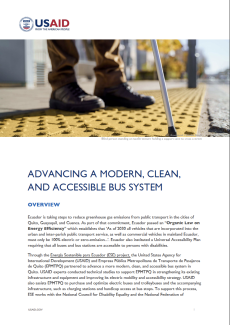ADVANCING A MODERN, CLEAN, AND ACCESSIBLE BUS SYSTEM
Ecuador is taking steps to reduce greenhouse gas emissions from public transport in the cities of Quito, Guayaquil, and Cuenca. As part of that commitment, Ecuador passed an "Organic Law on Energy Efficiency" which establishes that 'as of 2030 all vehicles that are incorporated into the urban and inter-parish public transport service, as well as commercial vehicles in mainland Ecuador, must only be 100% electric or zero-emission...' . Ecuador also instituted a Universal Accessibility Plan requiring that all buses and bus stations are accessible to persons with disabilities.
Through the Energía Sostenible para Ecuador (ESE) project, the United States Agency for International Development (USAID) and Empresa Pública Metropolitana de Transporte de Pasajeros de Quito (EPMTPQ) partnered to advance a more modern, clean, and accessible bus system in Quito. USAID experts conducted technical studies to support EPMTPQ in strengthening its existing infrastructure and equipment and improving its electric mobility and accessibility strategy. USAID also assists EPMTPQ to purchase and optimize electric buses and trolleybuses and the accompanying infrastructure, such as charging stations and handicap access at bus stops. To support this process, ESE works with the National Council for Disability Equality and the National Federation of Ecuadorians with Physical Disabilities to understand the disabled community's public transportation needs and access concerns. The lessons learned fall into three categories: retrofitting of diesel buses; selecting the appropriate electric buses for the conditions; and understanding accessibility requirements. These findings will assist transportation operators and municipalities to make strategic investments in electric buses and bus stations that are accessible to people with disabilities.

